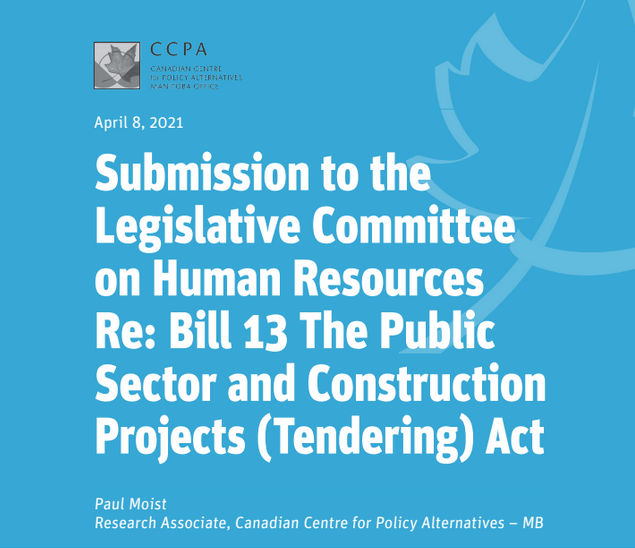
By Paul Moist
CCPA-Manitoba is a non-profit, independent research organization which does research and commentary on behalf of progressive organizations and the poor and marginalized in society.
We support the broad positions outlined in the submissions of the Manitoba Building Trades and the Manitoba Federation of Labour.
- We oppose the ending of quality Project Labour Agreements (PLA’s) which have existed in Manitoba for over 50 years, and supported good paying jobs, worker training and safety on all government project construction sites.
- We reject the characterization of PLA’s as ‘forced unionization’. Manitoba courts have rejected this assertion by the Merit Contractors as did the Supreme Court of Canada in refusing to hear their 2012 legal challenge.
- We oppose the damage that Bill 14 will impose upon Manitoba skilled trades workers. Allowing private firms to pursue more profits by paying workers less is plain wrong and turns back the clock over 50 years.
As author Doug Smith in his 2017 article, ‘Labour Conflict at Hydroelectric Generating Stations’ (Manitoba History No. 85, Fall 2017) has argued, the original impetus for PLA’s was:
If wage rates were fixed, contractors would be obliged to compete based on skill and ability rather than their ability to cut wages’. (copy of complete article is attached)
Manitoba would be wise to embrace the principles of fairness contained in British Columbia’s Community Benefits Agreements (CBA’s). Announced in 2018 CBA’s include:
- Maximizing apprenticeship opportunities on major public infrastructure projects.
- Priority hiring and training for Indigenous peoples and women.
- Wage alignment to prevailing industry rates to promote good wages for all, wages able to support families.
- Every CBA must include a no-strike clause, ensuring no labour disruptions.
Like BC, Manitoba faces skilled trades shortages and a shortfall in terms of private sector apprenticeship opportunities. The COVID-19 pandemic underlines the importance of strong support systems to sustain labour force participation rates.
Building Trades unions have invested millions in training facilities. It is interesting to note that many opposed to PLA’s are not themselves involved in training skilled trades workers. For these groups it is the bottom line only that is driving their opposition to PLA’s. This stance found its way into the PC election platform in 2016:
Shop smarter with government purchasing by reducing the number of untendered contracts and ending forced unionization of company employees in order to work on public contracts.
As mentioned, PLA’s do not force unionization on anyone. They do promote fairness and prevent a ‘free ride’ for those who do not invest in either trades training or apprenticeship.
We submit that Bill 13 should be withdrawn.


